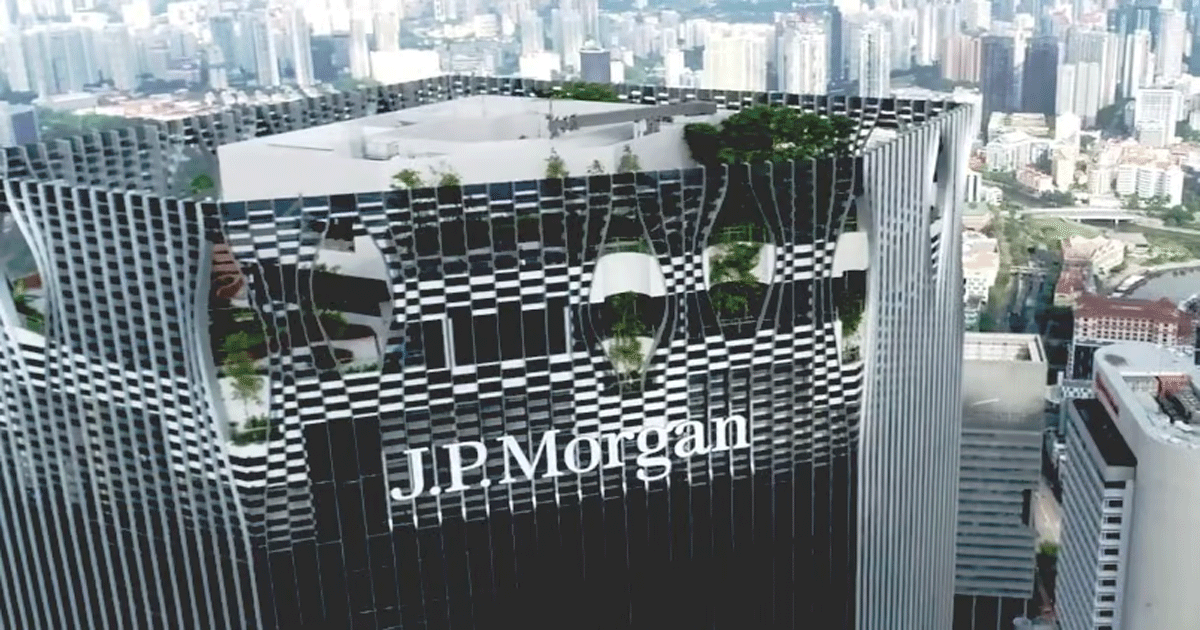Business
MAS Slaps Penalty Of SGD 2.4 Million On JP Morgan Chase Bank For Misconduct By Relationship Managers In 24 Bond Transactions

The Monetary Authority of Singapore (MAS) has imposed a civil penalty of SGD 2.4 million on JPMorgan Chase Bank, N.A. (JPM), according to a media release issued by the central bank of Singapore. The penalty was for JPMorgan Chase Bank failing to prevent and detect misconduct committed by its relationship managers (RMs).
The media release said: “In 24 over-the-counter (OTC) bond transactions, the RMs had made inaccurate or incomplete disclosures to clients, resulting in the clients being charged spreads that were above the bilaterally agreed rates.” These transactions took place between November 2018 and September 2019, said MAS.
Explaining that the RMs of JPMorgan Chase Bank had misled the clients into paying more than what they should have paid, MAS said that “JPM did not establish adequate processes and controls to ensure that its RMs adhered to pre-agreed spreads with clients when executing OTC bond transactions on their behalf”.
The central bank “sampled OTC bond transactions conducted by JPM’s RMs” and found that in the 24 transactions, the RMs had “either misrepresented the price components or omitted material information that the spreads charged were above the agreed rates”. The phrase “price components” refers to the executed interbank price and/or spread charged.
MAS said that this misrepresentation and omission by the RMs was “in contravention of sections 201(c) and 201(d) of the Securities and Futures Act (SFA)”.
Informing that the private bank had accepted these violations and its responsibility for what the relationship managers did, MAS said: “JPM has admitted liability under section 236C of the SFA for its failure to prevent or detect the misconduct by its RMs and has paid MAS the civil penalty. The bank has refunded the overcharged fees to affected clients.”
At the same time, JPMorgan Chase Bank has taken measures to prevent a repeat of this. “The bank has also enhanced its pricing frameworks and internal controls to prevent the recurrence of such misconduct,” said MAS. “Separate reviews into the individual RMs involved in the misconduct are ongoing.”
What is the MAS civil penalty?
“A civil penalty action is not a criminal action and does not attract criminal sanctions. The civil penalty regime, designed to complement criminal sanctions and provide a nuanced approach to combat market misconduct, became operational at the beginning of 2004,” said the MAS media release.
“Under section 232 of the SFA, MAS may enter into an agreement with any person for that person to pay, with or without admission of liability, a civil penalty for contravening any provision of Part 12 of the SFA. The civil penalty may be up to three times the amount of the profit gained or loss avoided by that person as a result of the contravention, subject to a minimum of USD 50,000 (if the person is not a corporation) or $100,000 (if the person is a corporation).”
Under section 201(c) of the SFA, no person shall, directly or indirectly, in connection with the subscription, purchase or sale of any capital market products, make any statement he knows to be false in a material particular.
● Section 201(d) of the SFA
Under section 201(d) of the SFA, no person shall, directly or indirectly, in connection with the subscription, purchase or sale of any capital market products, omit to state a material fact necessary in order to make the statements made, in the light of the circumstances under which they were made, not misleading.
● Section 236C of the SFA
Under section 236C of the SFA, a corporation which fails to prevent or detect a contravention of any provision in Part 12 of the SFA that is committed by an employee or officer for its benefit and attributable to its negligence, commits a contravention and shall be liable to an order for a civil penalty.
Business
Sensex, Nifty open lower amid fresh concerns over US tariffs

Mumbai, Jan 9: The Indian benchmark indices posted mild losses early on Friday amid rising geopolitical tensions and renewed threats of 500 per cent US tariffs on Indian goods under the provisions of the Russia Sanctioning Act.
As of 9.29 am, Sensex slipped 107 points, or 0.13 per cent to 84,073 and Nifty eased 26 points, or 0.10 per cent to 26,850.
Main broad cap indices posted stronger losses compared to benchmark indices, with the Nifty Midcap 100 down 0.29 per cent, while the Nifty Smallcap 100 lost 0.84 per cent.
ONGC and Bharat Electronics were among top gainers on the Nifty pack. Nifty realty and media were the top losers, down 2.14 per cent and 1.34 per cent, respectively. All sectoral indices were trading in red, except IT and PSU Bank.
Immediate support lies at 25,700–25,750 zone, and resistance placed at 26,150–26,200 zone, market watchers said.
After the sharp correction on Thursday triggered by the possibility of about a 500 per cent tariff on India under the provisions of the Russia Sanctioning Act approved by US President Donald Trump, the market will be focused on the verdict, expected from the US Supreme Court on the legality of Trump tariffs, analysts said.
On Thursday, Nifty extended its losing streak for a fourth consecutive session, falling 263 points to close at 25,876.
Asia-Pacific markets traded mixed in the morning session as investors parsed China’s inflation data which accelerated in December to the fastest pace in nearly three years.
In Asian markets, China’s Shanghai index gained 0.3 per cent, and Shenzhen added 0.57 per cent, Japan’s Nikkei advanced 1.14 per cent, while Hong Kong’s Hang Seng Index dipped 0.07 per cent. South Korea’s Kospi advanced 0.69 per cent.
The US markets were mostly in the green zone overnight even as Nasdaq lost 0.44 per cent. The S&P 500 gained 0.01 per cent, and the Dow moved up 0.55 per cent.
On January 8, foreign institutional investors (FIIs) sold net equities worth Rs 3,367 crore, while domestic institutional investors (DIIs) were net buyers of equities worth Rs 3,701 crore.
Business
Delhi HC stays order requiring second review of RBI Ombudsman complaints

New Delhi, Jan 8: The Delhi High Court on Thursday stayed a single-judge direction that required the Reserve Bank of India (RBI) to institute a second level of human review for consumer complaints dismissed by its banking ombudsman.
A division bench of Chief Justice D.K. Upadhyaya and Justice Tejas Karia passed the interim order on an appeal filed by the RBI against a ruling delivered by Justice Prathiba M. Singh, which required such reviews to be conducted by legally trained professionals, including retired judicial officers or lawyers with a minimum of ten years’ experience.
While staying the impugned directions, the CJ Upadhyaya-led Bench observed that, prima facie, it found force in the submissions advanced on behalf of the RBI.
“Accordingly, we provide that the directions contained in paragraph 47(5) and 48 of the impugned judgment by the learned single judge dated November 27, 2025, shall remain stayed,” it ordered.
The bench also stayed the single-judge’s direction requiring the RBI Deputy Governor to submit a compliance affidavit by January 15, 2026. The matter has now been scheduled for further hearing on March 17.
Appearing for the RBI, Solicitor General of India Tushar Mehta submitted that the single judge had travelled beyond the permissible scope of judicial review under Article 226 of the Constitution.
The Centre’s second-highest law officer submitted that the Reserve Bank-Integrated Ombudsman Scheme, 2021, is a statutory scheme framed under Section 35A of the Banking Regulation Act and Section 18 of the Payment and Settlement Systems Act, and can be altered or modified only by authorities empowered under those enactments.
In her November 27, 2025, ruling, Justice Prathiba M. Singh had expressed concern over complaints being rejected through “system-generated responses” and held that the Ombudsman Scheme must be “an effective Scheme and not a mere toothless division of the RBI”.
The judgment was delivered in a writ petition filed by advocate Sarwar Raza, who had approached the Delhi High Court alleging harassment and wrongful rejection of his complaints by the RBI Ombudsman following a disputed credit card transaction of Rs 76,777.
The single-judge Bench had directed the RBI to ensure that customer complaints are not rejected merely through a mechanised process and that complainants should be given an opportunity to correct minor errors.
It had further ordered that whenever complaints are finally rejected, they must undergo a second level of human supervision by legally trained personnel, observing: “If the complaint redressal mechanism adopted by the Ombudsman is made more effective and efficient, litigation in courts and consumer forum/s can be reduced considerably.”
Business
Sensex, Nifty end lower as India-US trade tension spook investors

Mumbai, Jan 8: Indian equity markets witnessed their sharpest fall in a month on Thursday as benchmark indices extended losses for the fourth straight session, weighed down by rising concerns over India–US trade tensions.
Investor sentiment turned cautious after reports suggested that the administration of US President Donald Trump could consider imposing steep tariffs of up to 500 per cent on Indian goods.
The possibility of such harsh trade measures triggered widespread selling across sectors, leading to broad-based risk aversion in the market.
By the end of the session, the Sensex closed at 84,180.96, slipping 780.18 points or 0.92 per cent.
The Nifty also ended lower at 25,876.85, down 263.9 points or 1.01 per cent.
“A sustained close below 25,900 increases the probability of further downside toward the 25,800–25,700 zone, while a recovery above 26,000 is essential to stabilise near-term sentiment,” an analyst said.
“Despite the current correction, the broader weekly and monthly trend structure remains positive, although short-term corrective pressure may persist if key supports fail to hold,” as per the expert.
On Sensex 30-packs, TCS, TechM, L&T, Reliance Industries and Tata Steel were among the top losers.
On the other hand, Eternal, ICICI Bank, Bajaj Finance, and BEL were the only gainers.
The selling pressure was even more pronounced in the broader market. Mid- and small-cap stocks saw sharp declines, with the Nifty Midcap 100 and Nifty Smallcap 100 indices falling nearly 2 per cent each.
Sector-wise, losses were widespread, with all indices ending in the red. Metal stocks bore the brunt of the sell-off as the Nifty Metal index dropped over 3 per cent.
Oil and gas stocks also remained under pressure, with the Nifty Oil and Gas index falling around 2.8 per cent.
PSU banking and IT stocks were among the other major laggards, declining about 2 per cent each.
Analysts said that the market mood remained cautious as investors grappled with global trade uncertainties and the potential impact of rising tariffs on India’s export-driven sectors.
-

 Crime3 years ago
Crime3 years agoClass 10 student jumps to death in Jaipur
-

 Maharashtra1 year ago
Maharashtra1 year agoMumbai Local Train Update: Central Railway’s New Timetable Comes Into Effect; Check Full List Of Revised Timings & Stations
-

 Maharashtra1 year ago
Maharashtra1 year agoMumbai To Go Toll-Free Tonight! Maharashtra Govt Announces Complete Toll Waiver For Light Motor Vehicles At All 5 Entry Points Of City
-

 Maharashtra1 year ago
Maharashtra1 year agoFalse photo of Imtiaz Jaleel’s rally, exposing the fooling conspiracy
-

 National News1 year ago
National News1 year agoMinistry of Railways rolls out Special Drive 4.0 with focus on digitisation, cleanliness, inclusiveness and grievance redressal
-

 Maharashtra1 year ago
Maharashtra1 year agoMaharashtra Elections 2024: Mumbai Metro & BEST Services Extended Till Midnight On Voting Day
-

 National News1 year ago
National News1 year agoJ&K: 4 Jawans Killed, 28 Injured After Bus Carrying BSF Personnel For Poll Duty Falls Into Gorge In Budgam; Terrifying Visuals Surface
-

 Crime1 year ago
Crime1 year agoBaba Siddique Murder: Mumbai Police Unable To Get Lawrence Bishnoi Custody Due To Home Ministry Order, Says Report












